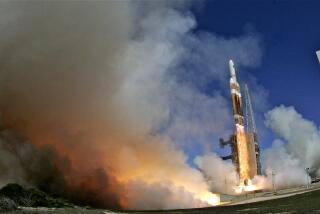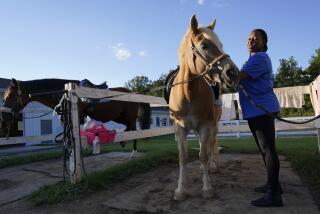Soldier’s Death at Base Provides Cautionary Tale
RAMADI, Iraq — The country boy from Georgia in his military fatigues and the suicide bombers in their beat-up pickup came together on a strip of weathered asphalt by the Euphrates River. He was brought there by patriotism, the bombers by religious zeal.
Spc. Marshall Lane Edgerton hopped aboard the pickup without hesitation, cheerfully stepping in for a U.S. Army comrade who hadn’t finished his chow. Other guards had already conducted a standard search of the vehicle and its two occupants. Now it was a routine escort at the heavily barricaded command center of the 82nd Airborne Division -- until fellow paratroopers heard Edgerton shouting. And then a massive explosion.
Months later, it is still unclear whether Edgerton’s shouts were a plea for help, cries of warning or some desperate combination of the two. But many GIs have contemplated the split second of dread that must have consumed the popular 27-year-old, who loved fishing, hunting, football and Jesus.
The bomb, crafted from four artillery shells weighing about 100 pounds each, shook the ground a mile away and blew out windows throughout the base. The payload had been concealed in the pickup’s gas tank, an investigation later showed.
Edgerton -- perhaps because his suspicions prompted the two bombers to detonate the explosives early -- was the sole U.S. fatality.
Although the Dec. 11 attack, in the heart of the volatile Sunni Triangle, marks a rare instance of a U.S. military compound being penetrated, it is a cautionary tale. Insurgents in Iraq are known to be trying for a mass-casualty strike on the U.S.-led coalition, a spectacular hit akin to the 1983 suicide truck bombing in Beirut that killed 241 Americans, mostly Marines.
It is a nightmare prospect for commanders, who preach “force protection” as their No. 1 priority yet acknowledge that any civilian visitor or vehicle among the hundreds entering U.S. bases each day may conceal a bomber, saboteur or assassin.
“If we can’t protect ourselves, how can we go out and protect anyone else?” asked Lt. Col. Charles Hardy of the 82nd Airborne.
The Army initially refused to discuss the case in detail but, with the 82nd having returned home to Ft. Bragg, N.C., officials agreed to provide more information on the security breach.
It turns out the attack was a case of catastrophe averted.
In a dramatic illustration of how thoroughly insurgents have penetrated U.S. operations in Iraq, the bombers had gained knowledge of the base’s layout and security procedures. They had determined that no X-ray or other sophisticated explosives-detection technology was in use. The deadly contents of the gas tank went unnoticed.
“These guys had a pretty good knowledge of goings-on around the compound,” said Maj. Michael A. Marti, the deputy intelligence officer for the 82nd, who investigated the attack and was among the first on the scene.
The attackers’ information, however, was not up to date. They appeared to be unaware that concrete barricades had been erected in front of the probable target, the base cafeteria. The barriers may have saved many lives that day, say military officials, who stress the importance of such protective construction, even inside the confines of supposedly secure compounds.
Base entrances in Iraq resemble the perimeters of high-security prisons. Concrete blast walls, coils of barbed wire, massive sandbags and vehicle obstacle courses greet visitors. Machine-gunners with high-tech optics stand in guard towers.
Moreover, most U.S. bases in Iraq, like this one, are established away from heavily populated areas to provide a buffer from would-be attackers. Mortar shells and rockets still strike regularly -- the base here was hit on 10 consecutive evenings last summer -- but the ordnance seldom reaches its mark.
Suicide bombers, by contrast, can be as precise as guided missiles. And Iraq has become the new capital of suicide bombings. At least 780 people have been killed in more than three dozen suicide attacks here since the first such major strike Aug. 19 on the U.N. compound in Baghdad, according to a Times compilation based on official statements and news accounts.
By contrast, at least 600 have been killed in suicide attacks in Israel since November 2000, according to figures from the Israeli Foreign Ministry.
Most victims of suicide attackers in Iraq have been civilians or police -- “soft” targets compared with the heavily armed and barricaded U.S. troops. Ezzedine Salim, the president of Iraq’s Governing Council was assassinated May 17 by a suicide car bomber as he waited in his vehicle to enter the headquarters of the U.S.-led occupation in Baghdad.
But U.S. and coalition forces also remain a tantalizing target for the allied Saddam Hussein loyalists and religious militants.
The attack here may have been tied to a suicide bombing ring that has struck three times in neighboring Khaldiya, twice attacking U.S. checkpoints, killing three U.S. soldiers and seriously wounding a fourth. The third attack killed at least 17 Iraqis at a police station.
Three weeks before the attack on the base here, Marti said, the Army broke up a cell that was preparing suicide car-bomb strikes on four police stations in Ramadi. Troops raided a safe house and killed eight militants, he said, some believed to be foreigners. Soldiers found 15 to 20 places set for what appeared to be a ritualistic final meal for the attackers and their accomplices.
“Everything was laid out like a Last Supper,” Marti said.
About 9 a.m. on Dec. 11, the run-down pickup truck pulled up at the gate of the 82nd’s headquarters, joining a cavalcade of supply vehicles waiting to enter. The truck was carrying carpets and lamps. Its two occupants waited for four hours, investigators later determined, as vehicles and motorists were searched and their tasks confirmed.
The pickup’s delivery was not a scheduled one. But the men inside provided the name of a unit that was supposedly expecting the goods, Marti said. A guard at the gate telephoned the unit, as is standard, and the delivery was approved, Marti said. The pickup entered the base about 1:15 p.m. Security procedures required that all nonmilitary vehicles have an escort. The duty was to go to one of Spc. Edgerton’s colleagues, but that soldier hadn’t finished his lunch. So Edgerton volunteered.
“Go ahead and eat your chow,” Edgerton told his comrade, according to Capt. Michael Dean, the specialist’s commanding officer in Alpha Company, 82nd Signal Battalion. “I’ll hop in this one.”
Edgerton jumped in along with the two men. The pickup pulled under the massive stone arches of the base -- once a lavish rest stop for Hussein’s family and guests -- and puttered onto the compound’s main road.
The vehicle passed the cafeteria, where many soldiers were finishing their lunch -- behind the recently installed concrete barricades.
“If the target was going to be the mess hall, which is what we think, whatever recon had been done previously did not take into account the wall,” Marti said.
The vehicle lumbered on, motoring about half a mile into the base before turning around and heading back toward the exit.
The attackers probably became edgy when they failed to find a ready target, Army officials theorize. Edgerton probably picked up on their nervousness. He appears to have stuck his head out the window and begun shouting when the truck was about 100 yards from the exit. He seemed to be struggling to get out, several witnesses later said.
“He had a look on his face like something was wrong, and he was yelling,” said Dean, who spoke with witnesses.
Then, about 1:30 p.m., the bombers employed some kind of triggering device.
Marti was outside, 50 to 75 yards away. He braced himself as the concussion of the blast shook him and gray smoke surged outward. A wheel from the pickup flew by and debris rained down. The major slapped a magazine in his weapon and rushed toward the scene.
There was no immediate sign of human remains amid the vehicle parts. Shrapnel had blasted holes in a concrete barracks; 20 or so soldiers were injured, mostly by flying glass.
The identities of the bombers were never discovered, Marti said, although they had shown Iraqi identification at the gate.
Army officials credit Edgerton with helping to prevent a catastrophe. At the minimum, his presence probably precluded the bombers from making another pass through the base. His shouts also alerted some people to take cover.
The case prompted a complete review of security measures at the base and led to improved procedures -- including better explosives detectors -- the Army says.
Edgerton, who served in Afghanistan before Iraq, left behind a wife, Amy, his high school sweetheart, and two children, Hunter, 7, and Alyssa, 2. In the few months between his Afghanistan and Iraq deployments, he helped Alyssa take her first steps. He coached Hunter’s T-ball team and taught the boy how to shoot a gun and ride a bike. Edgerton planned to leave the military when his four-year obligation was up in March. He had originally enlisted out of a sense of duty and a desire to learn new skills.
“He believed in Jesus, believed in family and country,” his stepmother, Ginny, wrote in an e-mail from Georgia to a Times reporter. “He always stood up for what was right.... If you were his friend, you would be his friend for life.”
The day after the attack, an Army chaplain and sergeant appeared at the Dalton, Ga., gas station of Edgerton’s father, Fred.
It is difficult for any parent to accept the death of a child. But the circumstances of Edgerton’s killing continue to perplex the family.
“He told me he was in a lot of danger in Iraq, but I never expected anything like this to happen,” Fred Edgerton said. “It just doesn’t seem real, for him to be that far away from home and get blown up that way. It just doesn’t seem real.”
*
Times researchers Jacquelyn Cenacveira and Vicki Gallay in Los Angeles contributed to this report.
More to Read
Sign up for Essential California
The most important California stories and recommendations in your inbox every morning.
You may occasionally receive promotional content from the Los Angeles Times.










